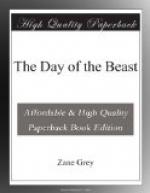Lane could grasp some infinitesimal truth of the sublime and horrible change war had wrought in the souls of soldiers. That change was too great for any mind but the omniscient to grasp in its entirety. War had killed in some soldiers a belief in Christ: in others it had created one. War had unleashed the old hidden primitive instincts of manhood: likewise it had fired hearts to hate of hate and love of love, to the supreme ideal consciousness could conceive. War had brought out the monstrous in men and as well the godlike. Some soldiers had become cowards; others, heroes. There were thousands of soldiers who became lions to fight, hyenas to snarl, beasts to debase, hogs to wallow. There were equally as many who were forced to fight, who could not kill, whose gentleness augmented under the brutal orders of their officers. There were those who ran toward the front, heads up, singing at the top of their lungs. There were those who slunk back. Soldiers became cold, hard, materialistic, bitter, rancorous: and qualities antithetic to these developed in their comrades.
Lane exhausted his resources of memory and searched in his notes for a clipping he had torn from a magazine. He reread it, in the light of his crystallizing knowledge:
“Had I not been afraid of the scorn of my brother officers and the scoffs of my men, I would have fled to the rear,” confesses a Wisconsin officer, writing of a battle.
“I see war as a horrible, grasping octopus with hundreds of poisonous, death-dealing tentacle that squeeze out the culture and refinement of a man,” writes a veteran.
A regimental sergeant-major: “I considered myself hardboiled, and acted the part with everybody, including my wife. I scoffed at religion as unworthy of a real man and a mark of the sissy and weakling.” Before going over the top for the first time he tried to pray, but had even forgotten the Lord’s Prayer.
“If I get out of this, I will never be unhappy again,” reflected one of the contestants under shell-fire in the Argonne Forest. To-day he is “not afraid of dead men any more and is not in the least afraid to die.”
“I went into the army a conscientious objector, a radical, and a recluse.... I came out of it with the knowledge of men and the philosophy of beauty,” says another.
“My moral fiber has been coarsened. The war has blunted my sensitiveness to human suffering. In 1914 I wept tears of distress over a rabbit which I had shot. I could go out now at the command of my government in cold-blooded fashion and commit all the barbarisms of twentieth-century legalized murder,” writes a Chicago man.
A Denver man entered the war, lost himself and God, and found manhood. “I played poker in the box-car which carried me to the front and read the Testament in the hospital train which took me to the rear,” he tells us.




